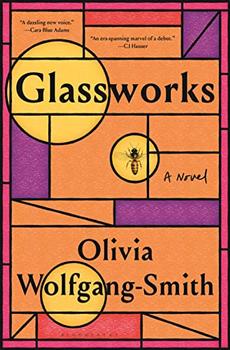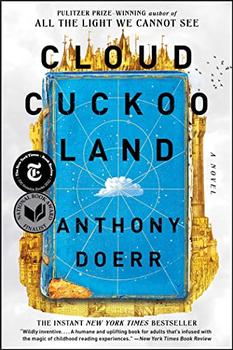Summary | Excerpt | Reading Guide | Reviews | Beyond the book | Read-Alikes | Genres & Themes | Author Bio

A gorgeously written and irresistibly intimate queer novel that follows one family across four generations to explore legacy and identity in all its forms.
In 1910, Agnes Carter makes the wrong choice in marriage. After years as an independent woman of fortune, influential with the board of a prominent university because of her financial donations, she is now subject to the whims of an abusive, spendthrift husband. But when Bohemian naturalist and glassblower Ignace Novak reignites Agnes's passion for science, Agnes begins to imagine a different life, and she sets her mind to getting it.
Agnes's desperate actions breed secrecy, and the resulting silence echoes into the future. Her son, Edward, wants to be a man of faith but struggles with the complexities of the mortal world while apprenticing at a stained-glass studio.
In 1986, Edward's child, Novak-just Novak-is an acrobatic window washer cleaning Manhattan high-rises, who gets caught up in the plight of Cecily, a small town girl remade as a gender-bending Broadway ingénue.
And in 2015, Cecily's daughter Flip-a burned-out stoner trapped in a bureaucratic job firing cremains into keepsake glass ornaments-resolves to break the cycle of inherited secrets, reaching back through the generations in search of a family legacy that feels true.
For readers of Mary Beth Keane, Min Jin Lee, and Rebecca Makkai, Glassworks is "an era-spanning, family and chosen-family following, marvel of a debut." (CJ Hauser, author of Family of Origin)
one
The Bohemian glass modeler went mad the summer of Agnes's marriage, and naturally at first society and the university board and Agnes's husband assumed a connection.
They had been so often thrown together, since Ignace had come to Boston. Since Agnes had brought him to Boston. It was nearly as if she had captained the ship herself, according to gossip and political cartoonists. Really it was her money that had done it. Dollar-green paper hands crewing the vessel, packing Ignace Novak's valises, shuttering his studio in Prague—and installing him in Cambridge with shelves of glass and enamel and a foot-powered bellows to melt it and a shotgun-startled expression on his face, hat knocked back as if by a blow, hair frazzled with the grease of his sudden voyage.
Agnes had long since learned what money could do, for better and for worse. It could tangle people into hopeless snarls, or spin them into neat skeins according to her specifications. It took skill to wield such a tool ...
Olivia Wolfgang-Smith's novel, Glassworks, is an incandescent debut that follows the lives of four people on the brink of metamorphosis. In addition to a marvelously multi-layered plot, Wolfgang-Smith's characters are drawn superbly, and her prose is as luminous as the glass about which she writes...continued
Full Review
 (668 words)
(668 words)
(Reviewed by Kim Kovacs).
 Cara Blue Adams, author of You Never Get It Back
With warmth, vividness, and humor, Wolfgang-Smith examines what we inherit and what is lost to silence and shows us how people come into themselves alongside the fragile legacies they build. A dazzling new voice.
Cara Blue Adams, author of You Never Get It Back
With warmth, vividness, and humor, Wolfgang-Smith examines what we inherit and what is lost to silence and shows us how people come into themselves alongside the fragile legacies they build. A dazzling new voice. CJ Hauser, author of Family of Origin
A page turner, a work of gorgeous prose, a rollicking good story full of brilliant observations about the human experience and characters I sometimes forget I do not know in real life...If Elizabeth McCracken and David Mitchell had a love child, it might look a bit like this era-spanning, family and chosen-family following, marvel of a debut.
CJ Hauser, author of Family of Origin
A page turner, a work of gorgeous prose, a rollicking good story full of brilliant observations about the human experience and characters I sometimes forget I do not know in real life...If Elizabeth McCracken and David Mitchell had a love child, it might look a bit like this era-spanning, family and chosen-family following, marvel of a debut. Jennine Capó Crucet, author of Make Your Home Among Strangers
Rendered in achingly gorgeous prose, Glassworks sweeps across generations, forging an engrossing portrait of a complex inheritance-a wise and inventive debut.
Jennine Capó Crucet, author of Make Your Home Among Strangers
Rendered in achingly gorgeous prose, Glassworks sweeps across generations, forging an engrossing portrait of a complex inheritance-a wise and inventive debut. Olivia Wolfgang-Smith's novel Glassworks begins with the heroine employing a Czech glass artist to create a collection of realistic flora and fauna for her university in Boston. In interviews, the author has stated that she was inspired by Leopold and Rudolf Blaschka, a father-and-son team who created thousands of remarkably detailed biological models in the late 19th and early 20th centuries.
Olivia Wolfgang-Smith's novel Glassworks begins with the heroine employing a Czech glass artist to create a collection of realistic flora and fauna for her university in Boston. In interviews, the author has stated that she was inspired by Leopold and Rudolf Blaschka, a father-and-son team who created thousands of remarkably detailed biological models in the late 19th and early 20th centuries.
Leopold Blaschka (1822-1895) was born into a glassworking family that traced its roots in the craft back to 15th century Vienna. Although as a child he dreamed of being a painter, he was apprenticed to a jewelry maker and gem cutter, eventually joining his father in the family glass business. He cut his teeth in the trade creating costume jewelry ...

If you liked Glassworks, try these:

by Elif Shafak
Published 2024
In the ancient city of Nineveh, on the bank of the River Tigris, King Ashurbanipal of Mesopotamia, erudite but ruthless, built a great library that would crumble with the end of his reign.

by Anthony Doerr
Published 2022
From the Pulitzer Prize-winning author of All the Light We Cannot See, perhaps the most bestselling and beloved literary fiction of our time, comes a triumph of imagination and compassion, a soaring novel about children on the cusp of adulthood in a broken world, who find resilience, hope, and story.




Being slightly paranoid is like being slightly pregnant – it tends to get worse.
Click Here to find out who said this, as well as discovering other famous literary quotes!